A total of 16 employees have received the 2024 Director’s Awards, which recognize employees who have exemplified the core values, issues, strategies, and goals of the Judiciary, as expressed in its Strategic Plan.
The recipients were nominated by colleagues based on career achievements and contributions to specific projects that have benefited their home courts and the federal Judiciary as a whole.
“This annual recognition continues the long-standing tradition of honoring exemplary performance, innovation, and dedication demonstrated by employees throughout the Judiciary,” said Judge Robert J. Conrad, Jr., director of the Administrative Office of the U.S. Courts. “Their accomplishments reflect the highest standards of our profession and serve as a testament to the remarkable dedication of our colleagues.”
Eight awards were granted, some to multiple employees, in three areas: Outstanding Leadership, Excellence in Judiciary Services, and Community Outreach.
The Director’s Award for Outstanding Leadership is given to managerial employees who have demonstrated exceptional leadership of a project of national significance. This can include exhibiting exemplary stewardship of resources; fostering innovations that improve service; increasing workforce productivity and conserving resources; promoting public access to and awareness of the role of the Judiciary; promoting safety and security, including cybersecurity; and enhancing public trust in the Judiciary.
Director’s Awards for Excellence in Judiciary Services recognize employees who have made specific contributions to improve efficiency, operations, or effectiveness. This may include outstanding contributions in areas such as administration, technology, court support, safety and security/cybersecurity, and legal services.
The Director’s Award for Community Outreach recognizes employees who promote understanding and build public trust and confidence in the Judiciary through community and public outreach.
Here are the 2024 Director’s Award winners and their achievements.
Outstanding Leadership
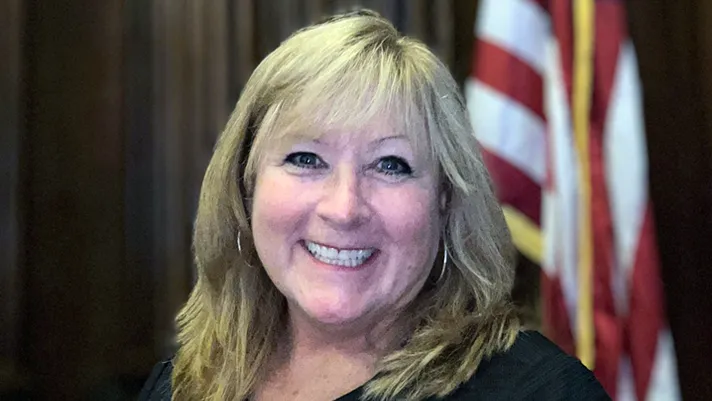
Heather A. Restifo, director of information technology for the District of Rhode Island, has been a longtime national IT leader and mentor, helping the Judiciary meet a wide range of challenges.
Restifo has been an integral part of modernizing various technologies that lent themselves to economies of scale and efficiencies. She helped move forward the convergence of voice, video, and data on one network that led to court staff being able to communicate through the Judiciary’s data communication network via the National IP Telephony system, National Video Teleconferencing system, Courtroom Technology systems, and which also led to the IT Security Program that exists now.
Restifo has displayed exceptional communication and leadership skills, fostering collegiality in her court and in national IT working groups, her nominating letter said.
Hanorah Tyer-Witek, Clerk of Court for the District of Rhode Island, wrote “Her ability to lead with empathy, clarity, and purpose has earned her the respect and admiration of her colleagues. She exemplifies the highest standards of leadership, consistently demonstrating integrity, accountability, and a relentless pursuit of excellence.”
Restifo has served in numerous national IT working groups, including the Judiciary Information Technology Security Task Force and as the original co-chair of the AO’s Court IT Operations Working Group, establishing that working group’s foundational structure.
During her tenure on the IT Security and Network Management Working Group, which included judges and court unit executives, Restifo “played a seminal role” in the planning and implementation of several foundational Judiciary technology systems, as well as the Judiciary’s first formal national IT security policies, Tyer-Witek wrote.
Tyer-Witek especially praised Restifo’s leadership in helping to establish the security program that currently protects the Judiciary’s information technology from cyberattacks.
“In addition to her technical acumen, Heather has been a champion of cybersecurity,” Tyer-Witek wrote. “She implemented rigorous security protocols and continuous monitoring systems to protect sensitive judicial data from cyber threats. Her proactive approach has set new standards for data security within the Judiciary, safeguarding the integrity and confidentiality of judicial information.”
Excellence in Judiciary Services
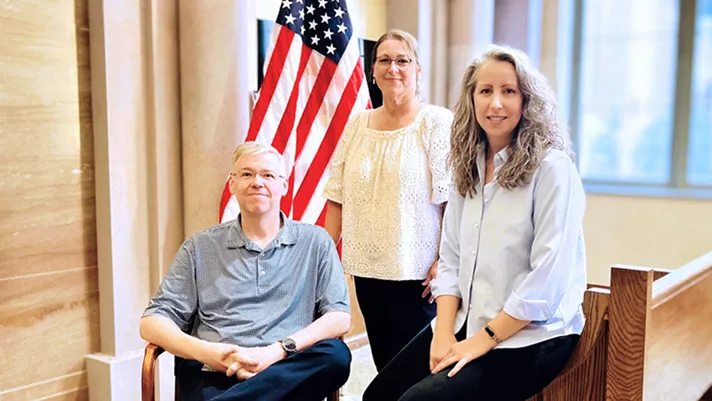
Three employees of the Western District of Oklahoma Bankruptcy Court have helped 50 bankruptcy courts and 29 district courts improve their case management operations by creating and modernizing a program known as Case Management Assist (CMA).
The employees — Scott Bellingham, IT manager; Aimee Stafford, special programs analyst; and Sue Frisch, operations supervisor — each have played distinct but inter-related roles in maintaining and growing the system.
The program automatically provides and organizes case information, so that court staff can more efficiently assign and perform quality control and monitoring of federal docket entries, claims, deadlines, etc. It also enables staff to easily access documents without having to run multiple reports in the Judiciary’s massive CM/ECF (Case Management/Electronic Case Files) system.
After Bellingham created the original CMA as a local program, he added multiple features. A home screen dashboard provides users with an overview of work to do, statistics measuring work completed, and the ability to reassign case management electronically. To assist prompt docketing, users receive alerts when a new order has been signed. And a notes feature enables users to exchange information without cluttering email inboxes.
Bellingham continues to improve and modernize CMA functionality, receiving suggestions from other courts on possible new features. He also performs security upgrades and maintenance for all courts using the system.
Stafford manages the training of participating courts, which includes facilitating webinars, providing one-on-one guidance to courts implementing CMA, developing and maintaining technical documentation, training videos, and presentations, and offering demonstrations to courts interested in adopting the system. Frisch, who is steeped in bankruptcy operations, is a “wellspring of ideas,” a nominating letter said, “offering suggestions for how the program can be enhanced to improve case administration and the supervision of it.”
The letter, written by Chief Judge Sarah A. Hall and Judge Janice D. Loyd, concluded by praising the employees’ “commitment to trying new ideas, working with colleagues to improve a resource, and sharing this resource across the Judiciary efficiently. They are the ideal Judiciary employees to earn a Director’s Award.”
Excellence in Judiciary Services
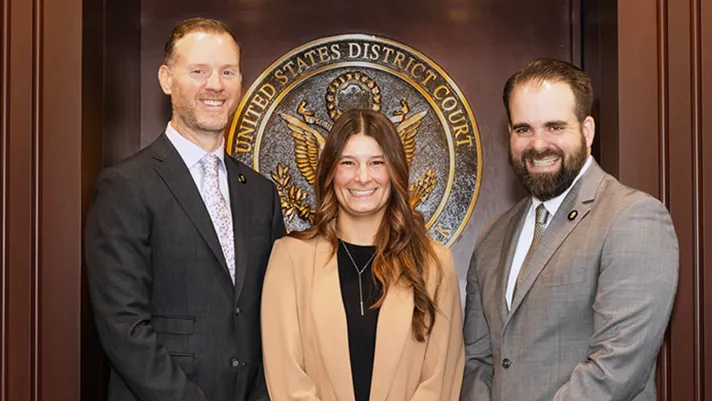
Three employees of the Northern District of New York (NDNY) aided detainees in jail environments by creating secure video kiosks in which detainees can speak confidentially with lawyers or probation officers, and transmit signed documents, without delays required for travel or mailing.
The employees are Nicole Eallonardo, courtroom deputy; Dan McAllister, chief deputy clerk of court; and Ryan Molloy, assistant IT director.
The system has won praise from defense lawyers, as well as pretrial and presentence-services probation officers, who can meet with clients more frequently and easily. It also has enabled federal deputy marshals to save resources related to transporting detainees between jails and courthouses.
“The NDNY’s Correctional Facility Kiosk System is a shining example of how thoughtful innovation can address complex challenges within the correctional environment,” wrote Clerk of Court John M. Domurad in a nominating letter.
The system initially was conceived during COVID-19, a time when many courthouses and jails were closed to the public due to health concerns.
But as the COVID emergency ebbed, the NDNY team continued to perfect a remote communication tool that would enable detainees to assist lawyers and supervising officers without leaving confinement. This was especially valuable given the size of the district, where detainees and lawyers can be more than a hundred miles apart.
“Unfortunately, the simple reality is that such distances strongly inhibit regular face to face attorney-client communication,” Domurad wrote. “It is well established that better communication equals better representation. When viewed from this perspective, the power of these new systems to provide enhanced justice cannot be overstated.”
More than 1,400 video conferences have taken place via the new facility kiosks, most often for attorney-client meetings. “Universally, defense counsel has praised how such communication strengthens their relationship with their clients, which in turn leads to more reasoned and cerebral decision-making by the clients,” Domurad wrote. “I can think of no higher compliment for a federal Judiciary program.”
Excellence in Judiciary Services
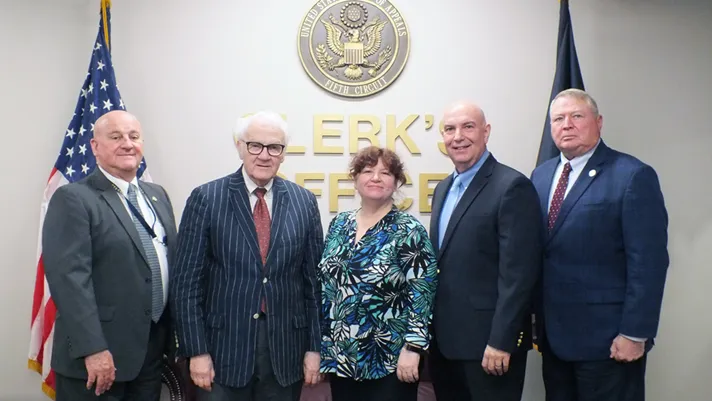
Five employees of the Fifth Circuit Court of Appeals created the Attorney Toolbox, an online resource that helps lawyers to more easily file and vet appellate documents. The system reduces time, stress, and staff costs for both parties and the court.
The employees are Lyle Cayce, clerk of court; Thomas “Tom” Plunkett, chief deputy clerk; Kenneth “Ken” Russo, technology division chief; Elroy Eckhardt, systems administrator; and Terry “TJ” Thorne, CM/ECF administrator.
The project grew out of extensive dialogue with appellate lawyers on ways to simplify filing. Five functions were included in the resulting Toolbox.
- Electronic Records. The Toolbox automatically creates a paginated Electronic Record of Appeal from the district court docket, which attorneys can download electronically. The circuit has eliminated requirements for a paper record of appeal, saving courts millions in dollars associated with paper documents.
- Brief Templates. New templates identify where specific information must be included in filing, to help ensure that all filings comply with court rules. Reducing erroneous submissions saves time and frustration for both the court and litigants.
- The Quality Control Program. Before submitting a brief, litigants may request that a PDF be scanned for possible errors. This has reduced by half the number of rejected briefs.
- The Record Excerpt Creation Program. Fifth Circuit rules require litigants to file excerpts from the record in the initial brief, to help the court assess the case. The Toolbox greatly eases creation and organizing of these excerpts. Some litigants reported that this feature has shortened the appeals filing process by several hours.
- Create and View Hyperlinks Program. This feature makes it easier for litigants to link to online documents in their pleadings, and to access document links submitted in filings by opposing parties.
“These five programs in the Attorney Toolbox leverage technology to make the court more efficient, provide better service to parties, and make it easier for parties to comply with court rules,” wrote Judge Cory T. Wilson, of the Fifth Circuit Court of Appeals. “The five nominees deserve recognition for their incredible accomplishments.”
The Fifth Circuit also is working to make the Toolbox available to litigants who do not have an attorney.
Excellence in Judiciary Services

Tammi Eller, a statistical analyst for the Western District of Washington Probation Office, played a critical role in two important projects, “The Bureau of Prisons (BOP) Offender Release Report” and the Immigration and Customs Enforcement Data Exchange pilot project.
The BOP release report, used by all 94 U.S. probation offices, allows users to display information on individuals scheduled to be released from custody into society.
The application enables probation officers to oversee inmate releases and ensure strict adherence to court-ordered terms of supervision, a nominating letter said.
“Both projects provide operational information to probation officers and staff that is critical to them in performing their mission,” wrote Monique D. Neal, chief probation officer for the Western District of Washington. “But they also help keep communities safer by helping to prevent people with court-ordered terms of supervision from ‘slipping through the cracks.’”
The Immigration and Customs Enforcement (ICE) Data Exchange facilitates information sharing between U.S. Probation and ICE, enabling both agencies to verify the deportation, detention, or release status of individuals who have federal supervision terms after their release from federal prisons. This collaborative effort allows probation officers to track more than 40,000 individuals who are in ICE custody.
“Tammi has consistently demonstrated exceptional leadership across diverse teams, projects, and initiatives,” Neal wrote. “Tammi maintains impeccable organizational skills, consistently striving to optimize product efficiency.”
Neal wrote that Eller showed a rare ability to gain deep understanding of BOP and ICE’s data procedures to allow different agencies to share information effectively with the Judiciary. As a result of the ICE Data Exchange, probation officers don’t need to create a hodgepodge of local practices to track individuals in ICE custody.
“Tammi's fluency in data, technology, and operations coupled with her unparalleled ability to synthesize the interconnected elements of those distinct domains, supports effective case management and the efficient management of limited public and judicial resources,” Neal wrote.
Excellence in Judiciary Services
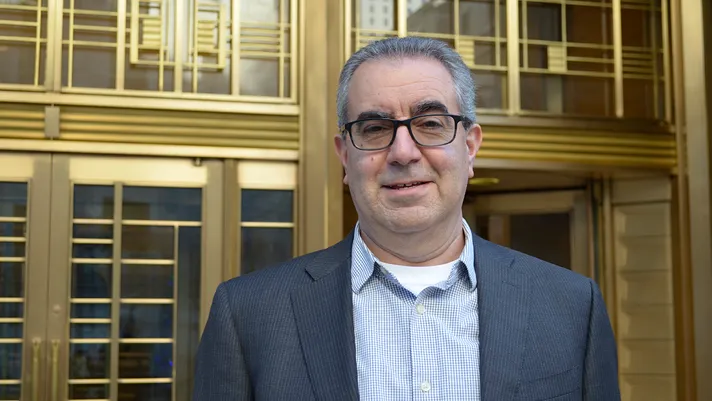
District Executive Edward Friedland, of the Southern District of New York, strengthened judicial security for judges in all of New York State, by working with legislators and the governor of New York to pass the Judicial Security Act, which makes it more difficult to trace personal information about judges through online databases.
The legislation closes a gap left by the Daniel Anderl Judicial Security and Privacy Act, passed in 2022. That law enables federal judges to seek removal of their information from online data brokers, but it did not limit the availability of judges’ information through state and local databases, such as tax records.
“For more than a decade, I have worked closely with Ed on court security matters,” wrote Judge Richard Sullivan, chair of the Judicial Conference’s Judicial Security Committee. “Over that span, Ed has demonstrated an unparalleled ability to forge relationships with the Judiciary and its key security partners. … He epitomizes the very best of government service. And we are all safer for it.”
Friedland's efforts entailed countless informational meetings with members of the New York legislature and their staff, as well as Governor Kathy Hochul and her staff. As possible legislation proceeded to the drafting stage, Friedland provided legislative staff with sample judicial security bills enacted in other states and commented on drafts of the New York legislation, identifying possible loopholes or areas of concern. The bill became law after Hochul incorporated it into her budget submission.
The New York Judicial Security Act thus allows for redaction of information from state and local government websites and public files, including the Department of Motor Vehicles, the Board of Elections, and property records. As a result of this legislation, data brokers will no longer be fed such information from New York State public records, thereby enhancing the security of federal and state judges across New York State.
Threats have grown against federal and state judges in recent years. The Daniel Anderl Act was named for the son of U.S. District Judge Esther Salas, of the District of New Jersey. Daniel, 20, was shot to death at the judge’s home in 2020 by a lawyer angered over the handling of a lawsuit.
Excellence In Judiciary Services
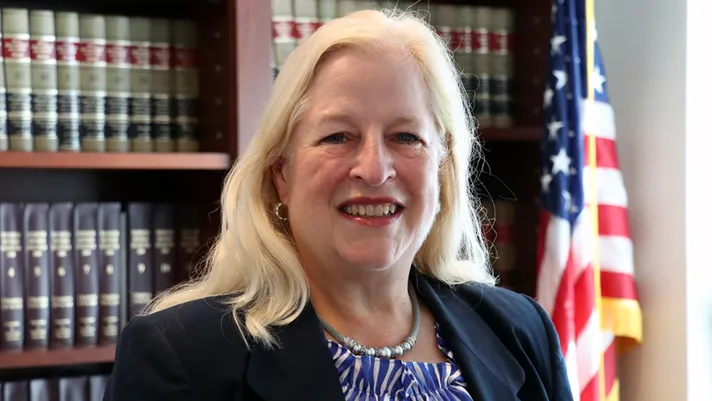
Clerk of Court Dana C. McWay, of the U.S. Bankruptcy Court for the Eastern District of Missouri, has been a national leader in helping bankruptcy courts to return unclaimed funds to their rightful owners.
Funds distributed in bankruptcy cases can go unclaimed for multiple reasons, including:
- Incorrect address for the recipient
- Uncashed distribution checks
- Death of intended recipient
Individual claims often can be quite small, and a recipient might not even be aware that they are entitled to a distribution from a bankruptcy court. A national unclaimed funds locator can help people search for money they might be owed.
McWay, who is chair of the expert panel for Unclaimed Funds, “raised the ongoing issues and concerns with unclaimed funds to a national level and brought together various parties-in-interest to review the issues and propose solutions,” said a nominating letter written by Clerk of Court Robert A. Gavin, Jr., of the U.S. Bankruptcy Court for the Eastern District of New York.
McWay also provided guidance and assistance to courts in standardizing forms and instructions for the withdrawal of unclaimed funds.
An important contribution has been to escalate communication, both to the public and bankruptcy lawyers and to court professionals who serve them. McWay has given numerous interviews to the media regarding unclaimed funds. And she has developed a draft press release, talking points, and a flier that bankruptcy courts can use in communicating about unclaimed funds.
McWay also helped create an internal website that provides resources to bankruptcy courts in administering applications for unclaimed funds.
“McWay has enhanced communication within the Judiciary, with the media and with the bankruptcy courts’ various constituencies,” Gavin wrote, “doing so in a professional manner while representing the Judiciary in a positive light.”
One challenge for courts is properly vetting applications to prevent fraudulent claims. McWay tackled this issue by providing bankruptcy courts with training materials for spotting fraudulent claim applications.
Community Outreach
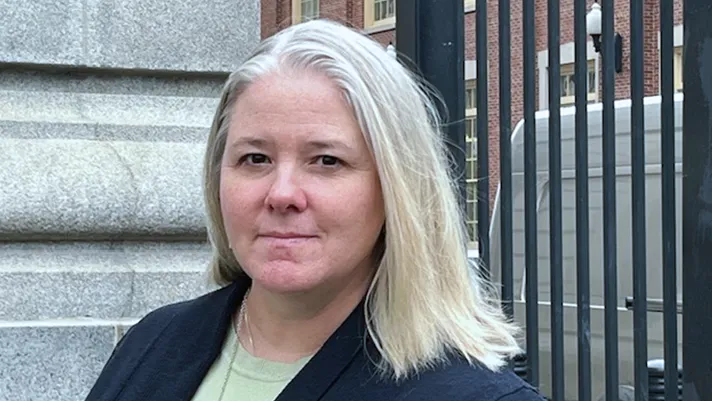
Hanorah “Nora” Tyer-Witek, clerk of court for the District of Rhode Island, has organized numerous community and public outreach events that have made the Judiciary more transparent and accessible as an institution.
“Nora has a remarkable track record of fostering community engagement and public education about the Judiciary,” wrote Chief Judge John J. McConnell, Jr., in a nominating letter. “Her efforts have not only educated the public but also inspired trust and confidence in the legal system.”
McConnell said Tyer-Witek’s outreach work has bridged the gap with numerous communities.
A retired 20-year U.S. Marine Corps lieutenant colonel, she arranged and participated in veteran legal issue discussions with members of the bar and other community members, highlighting the importance of veteran affairs and their relation to the Judiciary.
She also has worked with the Federal Bar Association to enable thousands of students and community members to participate in courthouse tours, mock trials, and interactive workshops. These initiatives have been instrumental in making the Judiciary more relatable and understandable to the general public, McConnell wrote.
“In addition to her direct outreach efforts, Nora has played a pivotal role in training and mentoring other Judiciary members in effective community engagement practices,” McConnell added. “She has organized and led workshops and seminars that equip judges, clerks, and other Judiciary staff with the skills and knowledge necessary to conduct meaningful outreach. Her leadership and vision have empowered many within the Judiciary to become ambassadors of public trust and confidence.”
As one example, Tyer-Witek in 2024 organized an educational trip to Montgomery, Alabama, available to all federal and state judges within the First Circuit. The conference was attended by more than 100 judges who explored Montgomery's civil rights legacy.
“Her innovative and inclusive approach, combined with her deep commitment to public service, has made a lasting impact on the communities she serves and the Judiciary as a whole,” McConnell wrote. “She is a true advocate for transparency, understanding, and public trust in the judicial system.”
Subscribe to News Updates
Subscribe to be notified when the news section is updated.
